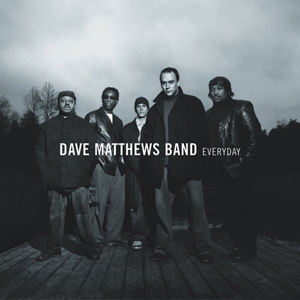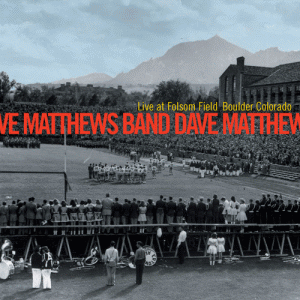
Led Zeppelin III is the third album by the English rock band Led Zeppelin, released on 5 October 1970. It was recorded in three locations. Much of the work was done at Headley Grange, a country house, using the Rolling Stones Mobile Studio. Additional sessions were held at Island Studios and Olympic Studios in London. As with the prior album, the band eschewed the use of guest musicians, with all music performed by band members Robert Plant (vocals), Jimmy Page (guitars), John Paul Jones, and John Bonham (drums). The range of instruments played by the band was greatly enhanced on this album, with Jones especially emerging as a talented multi-instrumentalist, playing a wide range of keyboard and stringed instruments, including various synthesizers, mandolin and double bass, in addition to his usual bass guitar. As with prior albums, Page served as producer on the album, with mixing done by Andy Johns and Terry Manning.

Dave Matthews Band is an American rock band from Charlottesville, Virginia. The band's lineup consists of Dave Matthews, Stefan Lessard (bass), Carter Beauford (drums), Tim Reynolds, Rashawn Ross, Jeff Coffin (saxophones), and Buddy Strong (keyboards). Matthews, Lessard, and Beauford formed the band in 1991 with LeRoi Moore (saxophones), Peter Griesar (keyboards), and Boyd Tinsley. After one independent live album, the band was signed by RCA Records and Griesar left the band to pursue as solo career.

Billy Breathes is the sixth studio album by American rock band Phish, released by Elektra Records on October 15, 1996. The album was credited with connecting the band, known for its jam band concerts and devoted cult following, with a more mainstream audience. The first single, "Free", was the band's most successful song on two Billboard rock charts, peaking at #11 on the Billboard Mainstream Rock Tracks Chart and at #24 on the Billboard Modern Rock Tracks Chart. The album itself became the band's highest-charting album on the Billboard 200, where it peaked at number seven.

Everyday is the fourth studio album by the American rock band Dave Matthews Band. It was released on February 27, 2001 through RCA Records. It is the band's first album to be produced by Glen Ballard, who also co-wrote all twelve of the album's songs with guitarist and vocalist Dave Matthews. The album marked a shift in the band's sound, prominently featuring electric guitar and concise pop arrangements.

Under the Table and Dreaming is the debut studio album by the American rock band Dave Matthews Band, released on September 27, 1994. The album's first single was "What Would You Say", featuring John Popper of Blues Traveler on harmonica. Four other singles from the album followed: "Jimi Thing", "Typical Situation", "Ants Marching", and "Satellite". By March 16, 2000, the album had sold six million copies, and was certified six times platinum by the RIAA.

Crash is the second studio album by the American rock band Dave Matthews Band, released on April 30, 1996 by RCA Records.

Before These Crowded Streets is the third studio album by the American rock band Dave Matthews Band. It was released on April 28, 1998, through RCA Records. The album was produced by Steve Lillywhite, his last collaboration with the group until 2012's Away from the World. Recording took place at The Plant Recording Studios in Sausalito, California and Electric Lady Studios in New York.

Busted Stuff is the fifth studio album by the American rock band Dave Matthews Band. It was released on July 16, 2002, through RCA Records. Much of the album's material was first recorded in 2000 during sessions with longtime producer Steve Lillywhite which were later scrapped. After the release of the Glen Ballard–produced Everyday in 2001, the band returned to the material, re-recording it with producer Stephen Harris.

The Lillywhite Sessions (tLWS) is a collection of songs recorded by Dave Matthews Band in 1999 and 2000 and produced by Steve Lillywhite. The songs, recorded by the band as a follow-up to their 1998 album Before These Crowded Streets, were ultimately scrapped by the band's label. Upon being forced by the label to abandon the album-in-progress, Dave Matthews was assigned to work with producer Glen Ballard who, in association with Matthews, wrote the album Everyday in just ten days. This contrasted with the band's prior style of writing, which included significant collaboration between the band members in the studio. The recordings later emerged on the Internet shortly after the release of Everyday, and created controversy among fans as well as the music industry, which was early in its campaign to curb illegal file downloads. The Lillywhite Sessions were never officially released, but most of the songs were later recorded for their 2002 album Busted Stuff.

Vagabonds of the Western World is the third studio album by Irish hard rock band Thin Lizzy, released in 1973. It was the band's last album with original guitarist Eric Bell and the first to feature the artwork of Jim Fitzpatrick, whose work would appear on many subsequent albums by the band.

Stand Up is the sixth studio album by the American rock band Dave Matthews Band. It was released on May 10, 2005 through RCA Records. The album was primarily recorded at Haunted Hollow Studio in Charlottesville, Virginia and was the band's first album to be produced by Mark Batson. It is the band's last album to feature full participation from saxophonist LeRoi Moore before his death in 2008.

Live at Folsom Field, Boulder, Colorado is the fourth live album released by the Dave Matthews Band. It was recorded in Boulder, Colorado at Folsom Field, the football stadium of the University of Colorado Boulder on July 11, 2001. It was released on the RCA Records music label on November 5, 2002 on Compact Disc, VHS, and DVD. The DVD was directed by Fenton Williams of Filament Productions. In promotional material prior to the release, the album was originally titled Open up the Curtains, a reference to the song "I Did It."
"JTR" is a song by Dave Matthews Band from their unreleased album, The Lillywhite Sessions. The song originated from "John the Revelator," a song written by Dave Matthews with the help from Carlos Santana. Matthews and Santana wrote "John the Revelator" as a love song about someone calling out to their unattainable lover. The "John the Revelator" lines that originally appeared in the song were suggested by Santana who got the idea from the traditional gospel song of the same name.

"Everyday" is the closing track and third radio single from Dave Matthews Band's album Everyday. It reached #38 on Modern Rock Tracks, and #8 on Adult Top 40. A live version of "Everyday" is featured on the Dave Matthews Band compilation album The Best of What's Around Vol. 1. The song evolved from an earlier DMB song entitled "#36" and references The Beatles' song All You Need Is Love.

Big Whiskey & the GrooGrux King is the seventh studio album by the American rock band Dave Matthews Band, which was released by RCA Records on June 2, 2009.

Destroyer is a Canadian indie rock band from Vancouver, formed in 1995. The band is fronted by founding member Dan Bejar, with a collective of regular band members and collaborators joining him in the studio and during live performances. Alongside Bejar, Destroyer currently includes longtime producers John Collins (bass) and David Carswell (guitar), Nicolas Bragg, Ted Bois (keyboards), JP Carter (trumpet) and Joshua Wells (drums).

Away from the World is the eighth studio album by the American rock band Dave Matthews Band. It was released on September 11, 2012 through RCA Records. The album was primarily recorded at Studio Litho in Seattle, Washington from January to May 2012 and is the band's first to be produced by Steve Lillywhite since Before These Crowded Streets (1998). It is the band's last album to feature full participation from violinist Boyd Tinsley before his departure in 2018.

Ryley Walker is an American singer-songwriter and guitarist from Rockford, Illinois.

Come Tomorrow is the ninth studio album by the American rock band Dave Matthews Band, and was released on June 8, 2018. The album is their first since 2012's Away from the World.

Deep Fried Grandeur is a collaborative live album by American musician Ryley Walker and Japanese band Kikagaku Moyo. It was released on February 5, 2021, through Walker's Husky Pants Records. The album was recorded during their performance at the 2018 Le Guess Who? festival in Utrecht, Netherlands, and its title comes from the name the two acts played under for the festival.



















